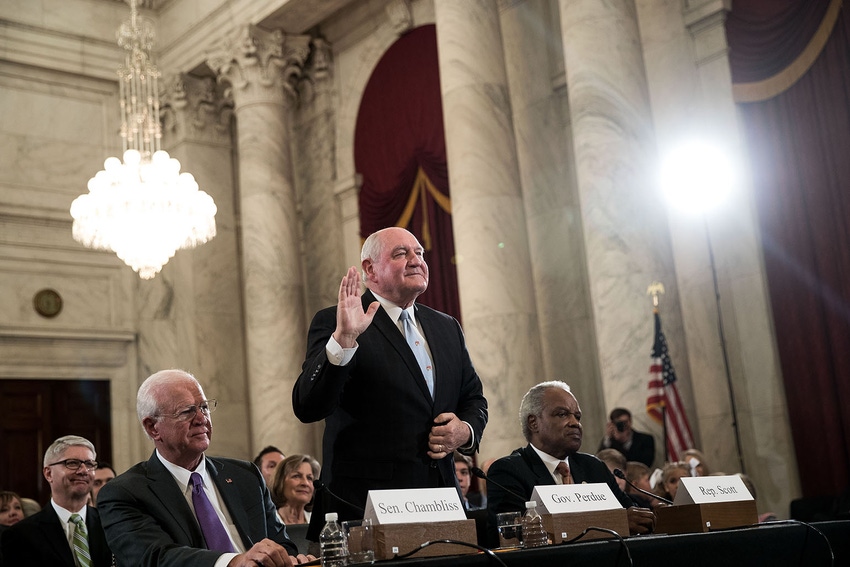Perdue pledges to advocate and fight for U.S. agriculture
Legislative Watch: Sonny Perdue's secretary of agriculture confirmation hearing proceeds; livestock groups push farm bill agenda; USDA gets spot on foreign investment committee; Trump declares Ag Day.

Former Georgia Gov. Sonny Perdue pledges to be a strong advocate and fight for U.S. agriculture if confirmed as the next Secretary of Agriculture. He made this pledge during his confirmation hearing before the Senate Agriculture Committee.
Perdue says if confirmed as Secretary of Agriculture, he had four primary goals that are “focused on an important constituency, the stakeholders of American agriculture.” Those goals are:
1) to maximize the ability of the men, women and agribusiness in American agriculture to “create jobs, produce and sell the foods and fiber that feed and clothe the world, and reap the earned reward of their labor;”
2) prioritize customer service efficiently, effectively and with integrity;
3) make certain USDA ensures the food consumers eat meets strict safety standards that have been established; and
4) be good stewards by supporting conservation efforts.
Members of the committee let Perdue know how important trade was for U.S. agriculture and it was important for him to fight for strong trade policy. Perdue says he would be agriculture’s “chief salesman around the world” and he would be agriculture’s voice within the Trump administration when it comes to trade.
During the hearing, he received numerous questions on trade, farm bill, biofuels, dairy, cotton, USDA’s budget, Environmental Protection Agency, nutrition, food safety and regulations. Committee members will be submitting additional written questions for Perdue to answer. The committee is expected to vote on his confirmation soon after they receive his answers. This is a strong desire to move Perdue’s confirmation as soon as possible.
Livestock producers discuss farm bill priorities
The need for a larger and more adequate foot-and-mouth disease vaccine bank is a top farm bill priority of the pork, beef and turkey industries. The National Pork Producers Council, American Sheep Industry, National Cattlemen’s Beef Association and National Turkey Federation are asking that the 2018 farm bill authorize USDA’s Animal Plant and Health Inspection Service to create and maintain an FMD vaccine bank and continued research at $150 million per year.
According to the NPPC, an FMD outbreak would cost the pork, beef, corn and soybean industries $200 billion over 10 years. NPPC says the farm bill should direct APHIS to:
• Contract for an offshore, vendor-maintained vaccine antigen bank that would have available antigen concentrate to protect against all 23 of the most common FMD strains currently circulating in the world.
• Contract for a vendor-managed inventory of 10 million doses – the estimated need for the first two weeks of an outbreak.
• Contract with an international manufacturer(s) for the surge capacity to produce at least 40 million doses.
The NCBA says, “Analysts estimate that an FMD outbreak in the United States could potentially cost our nation’s livestock producers billions of dollars in the first 12 months alone. An FMD outbreak has the potential to cause enormous economic losses to not only livestock producers, but also to auction markets, slaughterhouses, food processors and related industries.”
The associations say trade is critical to U.S. agriculture and urge Congress to protect and reauthorize USDA’s trade promotion programs – Foreign Market Development Program and Market Access Program.
The NCBA, NPPC and NTF stated their strong objections to the Obama-proposed Grain Inspection, Packers and Stockyards Administration’s “Farmer Fair Practices Rules,” and urged the Trump administration to rescind the rules because the rules would restrict producers’ ability to sell or packers’ ability to buy animals.
NPPC and NCBA urged that the new farm bill not bring back the country-of-origin labeling requirements as advocated by some groups. They reminded the committee the World Trade Organization had ruled against the last COOL requirement.
USDA to serve on federal committee that reviews foreign investments in U.S.
USDA and the Department of Health and Human Services would be given permanent representation on the Committee on Foreign Investment in the U.S. to protect food security under legislation introduced by Sens. Chuck Grassley (R-IA) and Debbie Stabenow (D-MI).
The “Food Security is National Security Act of 2017” includes new agriculture and food-related criteria for CFIUS to consider when reviewing transactions that could result in control of a U.S. business by a foreign company. The proposed transactions would be reviewed for their potential impact on U.S. food and agricultural systems, including availability of, access to or safety and quality of food.
Grassley says, “The approval by CFIUS of the sale of U.S. agricultural assets seem more focused on the present state of the food industry instead of the future supply situation. We owe it to our farmers and Americans who rely on farmers to grow their food to be more strategic. Especially as countries around the world are making moves to ensure adequate supplies.” CFIUS is a panel of government officials tasked with reviewing proposed mergers and acquisitions of U.S. companies, including foreign entities seeking to purchase U.S. agricultural and food assets.
Trump Declares March 21 National Agricultural Day
President Donald Trump signed a presidential proclamation declaring March 21 as National Agricultural Day. Trump mentions the importance of agricultural trade in the proclamation stating, agriculture is the “largest positive contributor to our nation’s net trade balance, generating 10% of our exports and millions of American jobs.”
Ray Starling, special assistant to the president for Agriculture, Trade and Food Assistance, mentions the importance of agricultural trade at the Agricultural Council of America’s event honoring Ag Day stating that President Trump is committed to “secure open and equitable access to foreign markets, that insist upon the use of sound science, that eliminate tariffs or subsidy regimes that unfairly disadvantage American products and hold our trading partners accountable when they invoke unfair or unjustified market practices.”
About the Author(s)
You May Also Like



